'There is no reason not to accept OHCHR assistance'
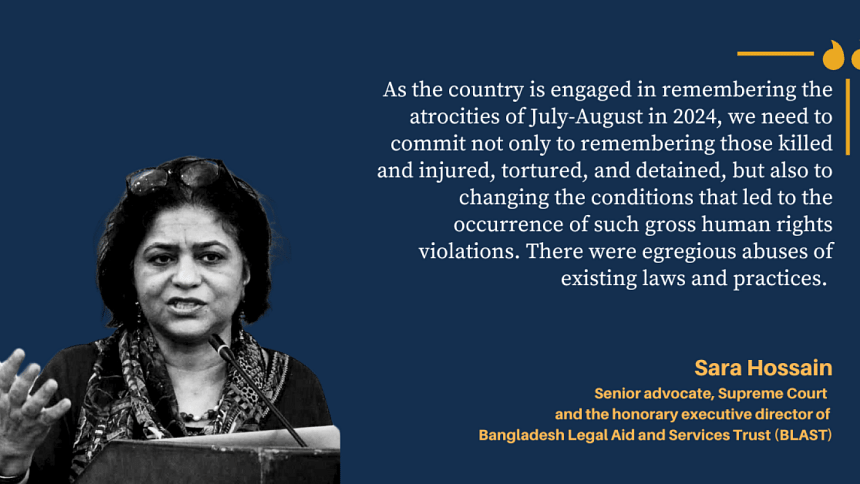
Sara Hossain, a senior advocate at the Supreme Court and the honorary executive director of Bangladesh Legal Aid and Services Trust (BLAST), talks to Monorom Polok of The Daily Star about the role of the UN rights mission in Bangladesh and the current human rights situation.
What do you see as the main role of the Office of the United Nations High Commissioner for Human Rights (OHCHR) in Bangladesh right now?
It is widely acknowledged that most Bangladeshi institutions, particularly those of accountability, have become deeply dysfunctional, and their independence severely compromised. This process has accelerated over the last few years. Therefore, it is very important to start the process of rebuilding, particularly so for the institutions of accountability and those responsible for protecting human rights.
The UN Human Rights Office can play an important role in working with public authorities and civil society to build a clearer and common understanding about the universality of human rights and their integration in our own national laws and policies. Most importantly, the UN mission can help us identify and carry out the measures needed to ensure that these rights are enforced in practice, and also begin the process of change.
Will the OHCHR be working alongside existing institutions?
Yes. According to my understanding, the OHCHR office in Bangladesh will supplement, complement, and assist in strengthening the capacity of local institutions to function effectively in protecting human rights. It is not supposed to replace those institutions. We still need independent and accountable courts, an independent and effective human rights commission, and law enforcement agencies that operate without discrimination and apply the law equally to all. And we need laws that are fair, just, and non-discriminatory. We are a long way from having all these in place.
Bangladesh operates with a legacy of oppressive and arbitrary laws—many colonial, but many, ironically, made post-independence under different political governments. We have an even more oppressive and arbitrary legacy of practice, significantly exacerbated in recent years. It is a major task to begin the process of correction, and having the OHCHR's office assist us in that process is a logical course of action. There is no reason not to accept this assistance, particularly at a moment when we are going through a critical transitional period.
The office will help access the experiences of other countries that have undergone transitions and put in place transitional justice systems. I hope it can help us move beyond the zero-sum situation of reprisal and revenge, which we are witnessing frequently.
How can the OHCHR help make the National Human Rights Commission more effective?
The public information available regarding the MOU signed by the interim government states that the OHCHR mission will be involved in providing "technical assistance and capacity-building" in relation to the promotion and protection of human rights. Given that one of the core bodies responsible for these tasks in Bangladesh is NHRC, the OHCHR office could play a role in advising on needed reforms for it to operate independently and effectively, and on how it can be reconstituted and resources needed for it to function properly.
Some say the OHCHR hasn't been able to prevent atrocities elsewhere, like in Palestine. How relevant is that concern in our context, especially if we face repression again?
OHCHR alone cannot prevent atrocities anywhere when there is systematic denial by the concerned state or any authority of its duties, and a failure of the international community to act. But we saw that OHCHR's fact-finding mission has been crucial in gathering evidence systematically on the atrocities that occurred in July-August last year, the mass killings and injuries, and mass arrests. We have not as yet seen any similar effort from any national body, including those that have been so vocal in denouncing OHCHR. OHCHR's mandate is focused on addressing recent serious violations, including those under the previous government. So I presume that will be their main focus, and hope that they will also be able to assist with putting in place measures to ensure that our laws, procedures, and institutions can protect against repression and repressive practices.
Can the OHCHR help push reforms in policing or the legal system?
Yes, I hope so. Among the reform commissions, the recommendations by several, including the Police Reform Commission and Judicial Reform Commission, have not been included in the National Consensus Commission discussions. There are also important recommendations regarding justice in the reports of the labour, media, and women's commissions.
As the nation is engaged in remembering the atrocities of July-August 2024, we need to commit not only to seeking justice for and remembering those killed and injured, tortured, and detained, but also to changing the conditions that led to the occurrence of such gross human rights violations. There were egregious abuses of existing laws. We lived in a state of virtual lawlessness, where we witnessed law enforcement agencies and security forces, or others, killing people with state officials sanctioning and directing such actions. While accountability efforts have started, they must be fair, just, and transparent. We need to ensure that these are accompanied by real reparations, including measures to prevent such atrocities from occurring again. The OHCHR office can play an important role in advancing the Police Commission's recommendations, and also several others, including judicial reform.
Has the legal system, which was heavily influenced by Awami League, improved since the party's ouster?
The interim government has taken the initiative to set up a justice reform commission. Some reforms have already started, such as online filings or online hearings in some courts. But it is a different scenario when we consider the proposals for reforms to the criminal justice system, particularly on practices of arrest, detention, treatment in custody, and the making of bail orders.
The Commission of Inquiry on Enforced Disappearances is a very important initiative to investigate the allegations of disappearances reported in the past 15 years. We have ratified the related UN treaty too, which, by the way, did not receive the same kind of objection as the planned OHCHR mission did. However, we are still seeing widespread arrests and detentions, and the methods used in that are questionable.
One particular area of concern, prior to last July-August, and still today, has been about the right to personal liberty and the processes for granting and denying bail. There have been improvements, but in many cases, particularly in many of the so-called "wholesale" murder cases linked to the events of July-August mass killings, we are witnessing concerning practices, especially in the refusal of bail.
At the same time, some legal reforms have taken place. For example, repeal of the draconian Digital Security Act; adoption of the Cyber Security Ordinance; changes to both the civil and criminal procedures to reduce backlogs in the courts; a draft law on remedies for enforced disappearances; and action to strengthen the legal aid act. Most recently, the Advisory Council approved changes to the Code of Criminal Procedure, which would bring into legislation essential safeguards in cases of arrest and detention. So things are happening with regard to changing laws.
But the paradox is that these are happening alongside concerning practices from the past, especially in "politically sensitive" cases. Change won't come overnight, but we can do much more to make the justice system fairer and non-discriminatory.
While the Awami League is no longer in control of the justice system, the real question is whether the justice system can function independently. Independence means freedom from any kind of pressure, not just from political parties like Awami League, but also from other political forces, from public pressure, or from fear.
Many people have spoken of the fear factor operating to inhibit judges from acting independently. It's vital that judges are able to make decisions without fear or favour. Not influenced by anyone, and not afraid of consequences. It's difficult to say we are there yet.
Are there other key areas where the interim government should have done more?
Yes, several. Police reform should have been a top priority. Judicial reform, particularly the criminal justice system, is also a critical area.
We've seen the criminal justice system being used as a tool of retaliation and weaponised by various political groups over many years, not just in Bangladesh, but in much of South Asia.
This won't change overnight, but we should have seen more urgent efforts in this area, and some changes by now. People must be more alert to call out the repetition of bad practices from the previous regime and earlier. Arbitrary arrest and detention, in particular, need to stop. Firm action should be taken to prevent and to hold accountable those who seek to determine outcomes through threat and intimidation and "mob violence," whatever their political affiliations.
Would you like to add anything about the OHCHR's role in Bangladesh?
In many countries where UN missions operate, they are in post-war or post-conflict contexts. Bangladesh is not emerging from a war, but we are emerging from a period of severe and systematic repression. We still lack fully functioning, independent, and accountable institutions. Transitional justice approaches are important for us, alongside efforts to ensure justice and accountability. There is also the need for victim-centred approaches, by ensuring reparations, and truth-telling about the kinds of atrocities that have occurred, the impact those left on victims, and the roles and responsibilities of different actors to break the selective silences that have engulfed our country at different times. In this situation, the UN mission could help build the process of respect for universal human rights for society and the state.
Follow The Daily Star Opinion on Facebook for the latest opinions, commentaries and analyses by experts and professionals. To contribute your article or letter to The Daily Star Opinion, see our guidelines for submission.

 For all latest news, follow The Daily Star's Google News channel.
For all latest news, follow The Daily Star's Google News channel. 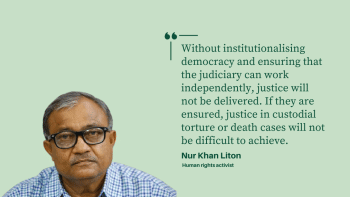



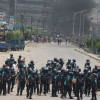


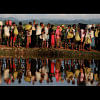
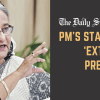


Comments